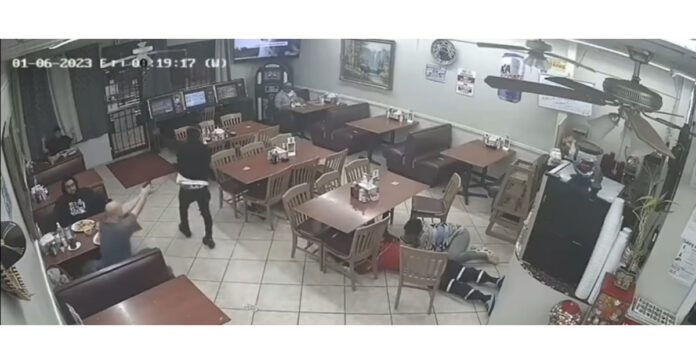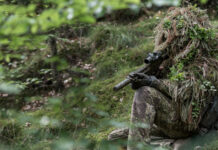I assume you have all seen the surveillance footage of the customer in the Houston taqueria kill an armed robber. (If not, see the video at the bottom of this post.) There seems to be universal agreement that the armed customer, who many are calling a hero, had the legal and moral right to shoot the armed robber, but there is some doubt regarding whether he should have fired that last, ninth shot after he disarmed the criminal.
Legal Ramifications
Let’s get some basic legal questions out of the way:
- The good guy shot the bad guy. This is an example of self-defense and is legal in almost every state. Not only was he protecting himself, he was protecting the lives of everyone in the restaurant. Texas law gives the good guy a great deal of leeway here.
- Yeah, but he shot the bad guy in the back. That’s legal, in part because the bad guy still had his gun out and was pointing it at another patron. You could say the good guy effectively used the element of surprise to turn the tables on the robber.
- The good guy shot the bad guy nine times. The issues in the case are not how many times he shot him, but whether there was still a threat at the time. We don’t know and it wasn’t clear on the video.
- The bad guy had a fake gun. That doesn’t matter because everyone in the restaurant thought it was real and felt threatened with deadly force. If not, they wouldn’t have had their hand sup, hidden under the table, and given him their money. I think the shooter’s anger when he found out the gun was fake is a good indication that he feared for his life and wasn’t looking to kill someone.
- There is a possibility that the robber was leaving and the robbery was over. If our good guy chased the bad guy into the street and shot him while he was running away, that could be a problem, but that is not the case here. We don’t know whether he was leaving or just circling the restaurant. The bad guy might have been about to grab the customer by the door and hold a gun to his head. Anyone who says he was leaving is making an assumption.
- The robber was just paroled after spending 7 years in jail for a similar armed robbery in which one of the other robbers killed someone. This doesn’t matter because no one in the restaurant knew his criminal history. All this tells us is he didn’t learn his lesson.
- The good guy and all the witnesses left the scene. This was a tactical mistake because it gives the impression the shooter felt guilty and didn’t want to talk to the police. The shooter would be on firmer ground if he had stuck around. Also, having some of those other witnesses available might help him if this goes to trial.
- It appears the last shot was unnecessary because the bad guy was already down and disarmed. Some might argue that if the first shot was legal, then all were legal. Let’s talk about that in greater detail.
The Coup de Grâce
When I first saw the video, I admit winced and thought to myself, “Ooh, that last shot was a bad one.” But I wasn’t there. None of us after-the-fact commentators were there. We don’t know what the armed citizen was thinking. We don’t know how he felt, what kind of adrenaline rush he was experiencing. There is no information available on whether or not he has had any training or what caliber he was using. We also can’t tell if the guy on the ground was still moving. Did he have any drugs in his system? Was he wearing a vest? With all those unknowns, we can’t judge. It’s all very well to say, “I wouldn’t have taken that shot,” but I think it is more accurate to say, “I hope I would not have had to take that shot.”
We’ve all seen movies where the apparently dead villain rolls over, pulls out a second gun and opens fire. If the only training our hero has comes from watching action adventure movies, then that final head shot may be a perfectly reasonable response, given his mindset and experience.
I believe we need to give the armed citizen the benefit of the doubt. He went out to get dinner and wasn’t looking for trouble. Someone pull a gun on him, and he had to exercise his right to fight back. He is the innocent victim. The bad guy decided to put on a mask, pick up a gun and walk into the restaurant with bad intent. What happened is on him. Had he stayed home and played video games, he’d still be alive.
Would YOU Take the Shot?
Having given this matter some subsequent consideration, I can tell you that there are times I would make the “execution” shot. For example, if the guy on the ground was scrambling for his waistband, I’d take the shot. After all, I carry two guns. Most cops carry two guns. It is reasonable to expect of armed robbers might, too. Likewise, he might be wearing a vest and be down but not out.
Another example is if there were multiple bad guys involved, I would want to make sure the one down was completely out of action before I left him behind me to engage the others. So don’t rule it out; one day a situation might be force you to make the same decision while you are in a life-threatening situation and experiencing a high level of stress.
You need to be prepared to do what it takes in a survival situation. If you find that morally repugnant, then I suggest you get over it before it is too late. If you find yourself in a world without the rule of law — and it appears we are moving that direction—then the only law may be the law of survival. In that scenario, you may have to do things you would not think of doing today.
In war, there’s a school of thought that it takes up more enemy resources to care for a wounded soldier than a dead one. That may be true, but we are not at war. The Geneva Conventions don’t apply when a masked guy bursts into a room waving a gun around and making threats. If one or more armed people bust into your house in a post-SHTF situation, the only rule that matters is that they all die and you all live.
What Happens Next?
Police have talked to the shooter, who was smart enough to get an attorney before he turned himself in for questioning. He is not under arrest, but the DA has sent the matter to the grand jury. This is not a big surprise.
I predict that the good guy with a gun who stopped a bad guy with a gun will be indicted because they are in Harris County, Texas, which has a liberal prosecutor. If this happened in my county and many others, I do not think he would be indicted. In fact, in many locations, the DA might choose not send it to the grand jury.
The one mitigating factor is Houston is plagued with armed robberies, car jackings, and gun violence. The citizens are sick and tired of it. Many of them may feel this robber got what he deserved.
The police and the DA have proven ineffective in combatting the rising crime wave, so more and more citizens are taking matters into their own hands. There is also a great deal of local TV coverage on this shooting and it’s now common knowledge that the dead man was recently released from jail and was no angel. Maybe there will be some political and public pressure on the DA not to prosecute. Not being very aggressive with the grand jury could give the DA a graceful way out.
If the grand jury returns an indictment, I predict the DA will try to go for a plea deal. I hope the armed citizen and his attorney hold out for a jury trial and go for justifiable homicide. If he has an experienced attorney, I expect they will find him not guilty. I also hope he has concealed carry insurance to cover some of his legal costs. If not, then someone should start raising funds for his defense.
Whatever happens in criminal court, the victim’s family will probably sue him in civil court.
Lessons
- Appearances and perceptions matter. The shooting was legal. Except for some poor judgment calls made by our armed citizen, this would be an open and shut case and he would be in the clear. He may still be, but it would go easier if he doesn’t ahve a good explanation for the last shot.
- Headshots to stop an attack are fine, but execution-style shots look bad (see lesson 1) and can cause you legal problems. If his first shot had blown a hole in the bad guy’s skull, this would not go to trial.
- Leaving the scene of the crime makes you look guilty. You should only leave if you think there is still a threat or if you re injured and must seek medical attention.
- Shooting an attacker when he looks away or turns his back on you is an excellent wayt to get the drop on an armed robber. There are multiple videos on this topic out there.
- This robber made several mistakes which lead to his death. I’m not going to train the next generation by listing them, but see how many you can spot.
- If you can avoid it, don’t live in an area with a high crime rate. I get that economics often dictates where people have to live. I lived in my share of not-so-hot neighborhoods until I finally left New York. But you don’t have to stay there. Look for a way out.
- Shooting someone will change your life and may ruin it. While the armed citizen had the right to shoot the bad guy, he also had the right to do nothing. I think he acted in good faith. I’d give the shooter the benefit of the doubt, and I hope a jury will, too.
Video
This video is one of the few that shows the entire shooting. All the TV coverage cut off before he fired the first shot. The commentary is a little long winded but the make some good points.








